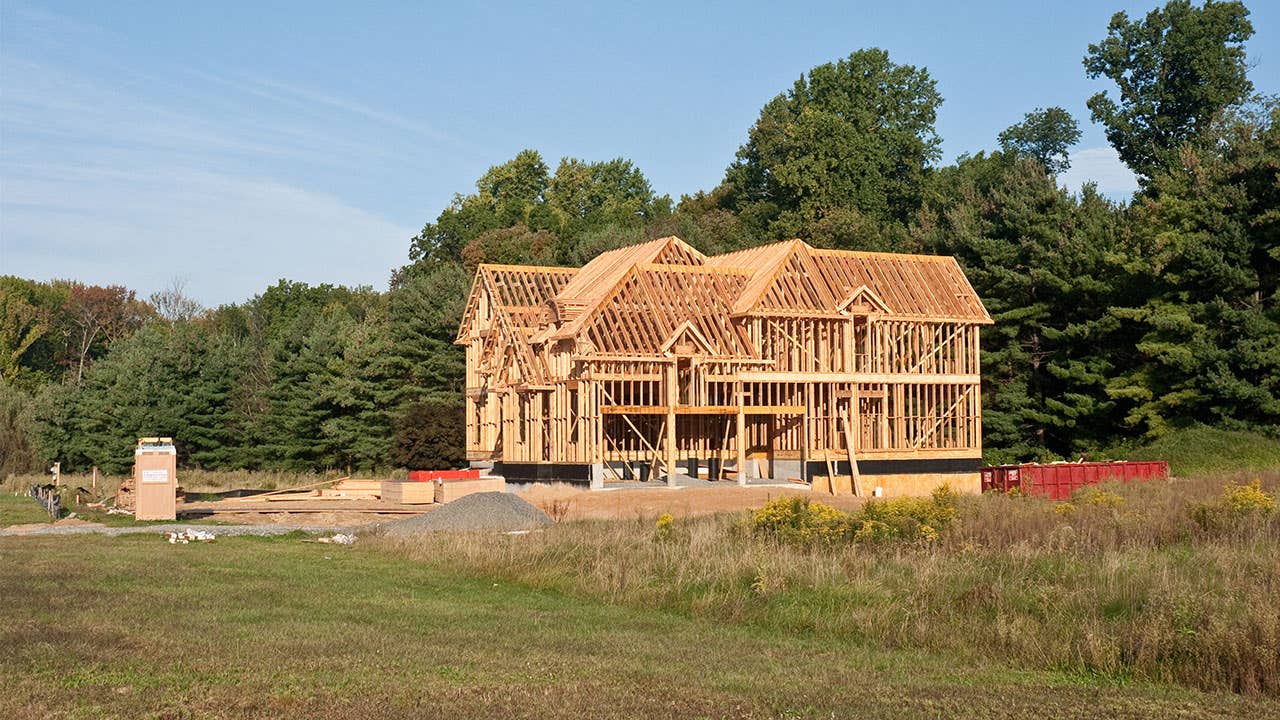Buying a new-construction home: What to know — and what to avoid

In today’s interest rate environment, many homeowners who might prefer to sell are instead staying put, as a new mortgage would result in a higher rate and payment. This lock-in effect is keeping existing home inventory tight. Meanwhile, though, the inventory of available new-build homes is high.
Buying a newly constructed home comes with its own benefits and drawbacks. Here is what to know about the current market, plus major mistakes to avoid when buying a new build.
- There was an 8.1-month supply of new-construction homes in April 2025, according to the U.S. Census Bureau.
- That’s almost double the inventory of existing homes, which National Association of Realtors data put at a 4.4-month supply in the same month.
- New homes in April had a median sale price of $407,200, according to the Census Bureau. That’s down 2 percent from the same time last year.
- According to a 2024 report from the National Association of Home Builders (NAHB), the median single-family home start was 2,200 square feet.
- Construction of smaller homes is lagging behind: 26 percent of homebuyers said they wanted a single-family home with less than 1,600 square feet, but only 16 percent of homes started fit that description.
Types of new-construction homes
D.R. Horton, Lennar, Ryan Homes, Toll Brothers and Pulte Group are some of the biggest names in the building business. However, these companies don’t all build the same kinds of homes; the label “new construction” can come in a few different formats:
- Custom: Appropriately named, custom homes can be customized to your exact preferences — you get a say over every detail that goes into it. With a custom home, you might purchase a piece of land and then work with a builder to determine everything from the front doorknob to the type of roof. These are the most expensive kind of build.
- Semi-custom: This is the next step down from custom. While you won’t get to pick everything that goes into the property, you will have options to choose from. Likely, a developer already bought the land and you’re now able to have a say in finishes and other factors.
- Production or spec: With this type of new-construction home, you don’t get to customize everything — but that also means you won’t have to pay so much for everything, either. A spec house in particular will likely be fully completed and sold as-is. These tend to have the fastest timelines and be the cheapest new-build option.
5 mistakes to avoid when buying new construction
1. Don’t assume you can’t negotiate with the builder
The top myth buyers of new-construction homes tend to believe is that builders won’t negotiate with them on price. That’s just not true, says Kerron Stokes, a broker/Realtor with RE/MAX Leaders in the Denver area.
“You can negotiate prices, lot premiums and upgrades in today’s market — many builders have financial incentives to win you as a client,” Stokes says. “Builders are less inclined to say no if you are a qualified and ready buyer.”
Keep in mind: As with much in real estate, many things can be negotiated with homebuilders.
Hiring a real estate agent who specializes in new construction can give you extra confidence in negotiating with builders. Also, Stokes says, builders typically pay the agent’s commission from their marketing budgets (which means you won’t have to).
2. Don’t forget to budget for items not included by the builder
New builds are blank slates. For instance, many new homes don’t come with landscaped yards; you get that big-ticket honor after you move in. And if you buy in a development with a homeowners association, you might have a limited window to put down grass or plant trees. Read your contract and the HOA rules carefully, so you can anticipate and budget for these expenses as early as possible.
Keep in mind: Be sure you understand what is included and what isn’t.
Note that new homes often don’t come with basics like window shades, toilet paper holders and towel racks, or sometimes even light fixtures. Clarify exactly what does and doesn’t come standard with your new home beforehand, so there are no surprises once you move in.
3. Don’t just go with the easiest lender option
Many large builders have in-house mortgage lenders or “preferred” companies they work with. These may or may not offer competitive rates and terms. If you don’t shop around for the best lender, you won’t have a basis for comparison.
Keep in mind: You’re not obligated to use your builder’s preferred lender.
New-construction buyer Chyrise Harris is glad she didn’t make this mistake. She was preapproved with an outside lender and was keen on sticking with that company to buy a new home in Denver’s Stapleton neighborhood. But her builder’s preferred lender won her business with a better customer experience. “Knowledge is power, but if you don’t have anything to compare your experience to then you don’t know if you’re getting the best service,” she says.
When in-house and outside lenders compete for your business, you gain more leverage to negotiate loan costs or interest rates, says Stokes, who was Harris’ real estate agent.
For example, he advises looking carefully before accepting incentives offered by a builder’s lender — they don’t always save you money. “If a builder’s lender says, ‘We’ll give you $15,000 in incentives if you choose us,’ but an outside lender charges a quarter of a percentage point less in the interest rate over the life of the loan, that $15,000 incentive may wind up being more expensive in the long run,” he says. “You want to rate-shop for your loan throughout the entire build process.”
4. Don’t ignore the builder’s warranties and timelines
When you buy a new-construction home, there are two types of builder warranties you’ll hear about: implied and express.
Implied warranties cover potential defects in workmanship that impact a new home’s habitability, livability and safety, based on local building codes and standards, says David Jaffe, former vice president of legal advocacy at the NAHB. These tend to be vaguely worded, and they usually have a 10-year liability cutoff period for builders, he adds.
Some builders offer an express warranty, which has more precise wording on what is covered and cutoff times for varying parts of a new build. “An express warranty spells out the problems and remedies a builder is responsible for, as well as the duration of the warranty and a mechanism for disputing issues,” Jaffe says. “This type of warranty provides more defined terms. Builders live and die on their reputation, so they don’t want to get into long, drawn-out legal battles.”
Keep in mind: It’s important to know exactly what’s covered and what the delivery times should be.
Sometimes, builders ask buyers to waive their rights under an implied warranty when an express warranty is offered, so it’s important to read all warranties closely. Enlisting a real estate agent or attorney to review them, as well as the purchase contract, may help you avoid unscrupulous builders, Jaffe says.
Builder warranties are not a blanket guarantee for all types of defects or problems with a new home. Jaffe says they typically do not cover the following:
- Products covered by a manufacturer’s warranty (such as appliances)
- Damage caused by ordinary wear and tear
- Defects caused by lack of maintenance or neglect by the homeowner
- Defects in items installed by homeowners or contractors other than the builder
- Damage caused by natural disasters
Beyond reading the fine print of a builder’s warranty, make sure you understand their timeline on the completion of your new home as well. The exact times will vary based on the builder. Make sure yours lays out a detailed timeline for you, so that you can follow along — and hold them to it.
5. Don’t make upgrades that won’t increase value
One final mistake to avoid: Don’t get too caught up in customization. Options and add-ons can seem limitless when you walk into a builder’s showroom. But before you go on an upgrade spree, it’s wise to consider which ones will boost the home’s value rather than merely making it look nicer, Stokes says.
Keep in mind: Think twice before shelling out for add-ons that aren’t likely to recoup their cost.
“There is always a cost associated with upgrades, and some will help you realize value more than others,” Stokes says. For example, upgrading to quartz countertops from laminate, or from linoleum flooring to hardwood, are safe investments, he says — but if you opt for the top level of cabinets that costs an extra $10,000, you’re unlikely to recover that value at resale. If you really love it, the cost might be worth it to you, but consider carefully.
Another thing to consider is the cost difference between a builder upgrade versus hiring your own contractor to do the work later. Harris, the Denver buyer, had the option to include an air conditioner in her new home. She saved $1,000 by having the unit installed after she moved in rather than adding it to her construction tab, she says.
FAQs
Additional reporting by David McMillin and Sarah Sharkey
Why we ask for feedback Your feedback helps us improve our content and services. It takes less than a minute to complete.
Your responses are anonymous and will only be used for improving our website.






